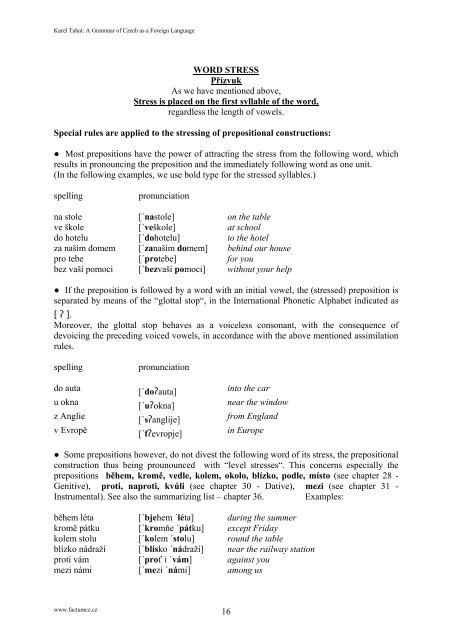- Page 1 and 2: Karel Tahal: A Grammar of Czech as
- Page 3 and 4: Karel Tahal: A Grammar of Czech as
- Page 5 and 6: Karel Tahal: A Grammar of Czech as
- Page 7 and 8: Karel Tahal: A Grammar of Czech as
- Page 9 and 10: Karel Tahal: A Grammar of Czech as
- Page 11 and 12: Karel Tahal: A Grammar of Czech as
- Page 13 and 14: Karel Tahal: A Grammar of Czech as
- Page 15: Karel Tahal: A Grammar of Czech as
- Page 19 and 20: Karel Tahal: A Grammar of Czech as
- Page 21 and 22: Karel Tahal: A Grammar of Czech as
- Page 23 and 24: Karel Tahal: A Grammar of Czech as
- Page 25 and 26: Karel Tahal: A Grammar of Czech as
- Page 27 and 28: Karel Tahal: A Grammar of Czech as
- Page 29 and 30: Karel Tahal: A Grammar of Czech as
- Page 31 and 32: Karel Tahal: A Grammar of Czech as
- Page 33 and 34: Karel Tahal: A Grammar of Czech as
- Page 35 and 36: Karel Tahal: A Grammar of Czech as
- Page 37 and 38: Karel Tahal: A Grammar of Czech as
- Page 39 and 40: Karel Tahal: A Grammar of Czech as
- Page 41 and 42: Karel Tahal: A Grammar of Czech as
- Page 43 and 44: Karel Tahal: A Grammar of Czech as
- Page 45 and 46: Karel Tahal: A Grammar of Czech as
- Page 47 and 48: Karel Tahal: A Grammar of Czech as
- Page 49 and 50: Karel Tahal: A Grammar of Czech as
- Page 51 and 52: Karel Tahal: A Grammar of Czech as
- Page 53 and 54: Karel Tahal: A Grammar of Czech as
- Page 55 and 56: Karel Tahal: A Grammar of Czech as
- Page 57 and 58: Karel Tahal: A Grammar of Czech as
- Page 59 and 60: Karel Tahal: A Grammar of Czech as
- Page 61 and 62: Karel Tahal: A Grammar of Czech as
- Page 63 and 64: Karel Tahal: A Grammar of Czech as
- Page 65 and 66: Karel Tahal: A Grammar of Czech as
- Page 67 and 68:
Karel Tahal: A Grammar of Czech as
- Page 69 and 70:
Karel Tahal: A Grammar of Czech as
- Page 71 and 72:
Karel Tahal: A Grammar of Czech as
- Page 73 and 74:
Karel Tahal: A Grammar of Czech as
- Page 75 and 76:
Karel Tahal: A Grammar of Czech as
- Page 77 and 78:
Karel Tahal: A Grammar of Czech as
- Page 79 and 80:
Karel Tahal: A Grammar of Czech as
- Page 81 and 82:
Karel Tahal: A Grammar of Czech as
- Page 83 and 84:
Karel Tahal: A Grammar of Czech as
- Page 85 and 86:
Karel Tahal: A Grammar of Czech as
- Page 87 and 88:
Karel Tahal: A Grammar of Czech as
- Page 89 and 90:
Karel Tahal: A Grammar of Czech as
- Page 91 and 92:
Karel Tahal: A Grammar of Czech as
- Page 93 and 94:
Karel Tahal: A Grammar of Czech as
- Page 95 and 96:
Karel Tahal: A Grammar of Czech as
- Page 97 and 98:
Karel Tahal: A Grammar of Czech as
- Page 99 and 100:
Karel Tahal: A Grammar of Czech as
- Page 101 and 102:
Karel Tahal: A Grammar of Czech as
- Page 103 and 104:
Karel Tahal: A Grammar of Czech as
- Page 105 and 106:
Karel Tahal: A Grammar of Czech as
- Page 107 and 108:
Karel Tahal: A Grammar of Czech as
- Page 109 and 110:
Karel Tahal: A Grammar of Czech as
- Page 111 and 112:
Karel Tahal: A Grammar of Czech as
- Page 113 and 114:
Karel Tahal: A Grammar of Czech as
- Page 115 and 116:
Karel Tahal: A Grammar of Czech as
- Page 117 and 118:
Karel Tahal: A Grammar of Czech as
- Page 119 and 120:
Karel Tahal: A Grammar of Czech as
- Page 121 and 122:
Karel Tahal: A Grammar of Czech as
- Page 123 and 124:
Karel Tahal: A Grammar of Czech as
- Page 125 and 126:
Karel Tahal: A Grammar of Czech as
- Page 127 and 128:
Karel Tahal: A Grammar of Czech as
- Page 129 and 130:
Karel Tahal: A Grammar of Czech as
- Page 131 and 132:
Karel Tahal: A Grammar of Czech as
- Page 133 and 134:
Karel Tahal: A Grammar of Czech as
- Page 135 and 136:
Karel Tahal: A Grammar of Czech as
- Page 137 and 138:
Karel Tahal: A Grammar of Czech as
- Page 139 and 140:
Karel Tahal: A Grammar of Czech as
- Page 141 and 142:
Karel Tahal: A Grammar of Czech as
- Page 143 and 144:
Karel Tahal: A Grammar of Czech as
- Page 145 and 146:
Karel Tahal: A Grammar of Czech as
- Page 147 and 148:
Karel Tahal: A Grammar of Czech as
- Page 149 and 150:
Karel Tahal: A Grammar of Czech as
- Page 151 and 152:
Karel Tahal: A Grammar of Czech as
- Page 153 and 154:
Karel Tahal: A Grammar of Czech as
- Page 155 and 156:
Karel Tahal: A Grammar of Czech as
- Page 157 and 158:
Karel Tahal: A Grammar of Czech as
- Page 159 and 160:
Karel Tahal: A Grammar of Czech as
- Page 161 and 162:
Karel Tahal: A Grammar of Czech as
- Page 163 and 164:
Karel Tahal: A Grammar of Czech as
- Page 165 and 166:
Karel Tahal: A Grammar of Czech as
- Page 167 and 168:
Karel Tahal: A Grammar of Czech as
- Page 169 and 170:
Karel Tahal: A Grammar of Czech as
- Page 171 and 172:
Karel Tahal: A Grammar of Czech as
- Page 173 and 174:
Karel Tahal: A Grammar of Czech as
- Page 175 and 176:
Karel Tahal: A Grammar of Czech as
- Page 177 and 178:
Karel Tahal: A Grammar of Czech as
- Page 179 and 180:
Karel Tahal: A Grammar of Czech as
- Page 181 and 182:
Karel Tahal: A Grammar of Czech as
- Page 183 and 184:
Karel Tahal: A Grammar of Czech as
- Page 185 and 186:
Karel Tahal: A Grammar of Czech as
- Page 187 and 188:
Karel Tahal: A Grammar of Czech as
- Page 189 and 190:
Karel Tahal: A Grammar of Czech as
- Page 191 and 192:
Karel Tahal: A Grammar of Czech as
- Page 193 and 194:
Karel Tahal: A Grammar of Czech as
- Page 195 and 196:
Karel Tahal: A Grammar of Czech as
- Page 197 and 198:
Karel Tahal: A Grammar of Czech as
- Page 199 and 200:
Karel Tahal: A Grammar of Czech as
- Page 201 and 202:
Karel Tahal: A Grammar of Czech as
- Page 203 and 204:
Karel Tahal: A Grammar of Czech as
- Page 205 and 206:
Karel Tahal: A Grammar of Czech as
- Page 207 and 208:
Karel Tahal: A Grammar of Czech as
- Page 209 and 210:
Karel Tahal: A Grammar of Czech as
- Page 211 and 212:
Karel Tahal: A Grammar of Czech as
- Page 213 and 214:
Karel Tahal: A Grammar of Czech as
- Page 215 and 216:
Karel Tahal: A Grammar of Czech as
- Page 217 and 218:
Karel Tahal: A Grammar of Czech as
- Page 219 and 220:
Karel Tahal: A Grammar of Czech as
- Page 221 and 222:
Karel Tahal: A Grammar of Czech as
- Page 223 and 224:
Karel Tahal: A Grammar of Czech as
- Page 225 and 226:
Karel Tahal: A Grammar of Czech as
- Page 227 and 228:
Karel Tahal: A Grammar of Czech as
- Page 229 and 230:
Karel Tahal: A Grammar of Czech as
- Page 231 and 232:
Karel Tahal: A Grammar of Czech as
- Page 233 and 234:
Karel Tahal: A Grammar of Czech as
- Page 235 and 236:
Karel Tahal: A Grammar of Czech as
- Page 237 and 238:
Karel Tahal: A Grammar of Czech as
- Page 239 and 240:
Karel Tahal: A Grammar of Czech as
- Page 241 and 242:
Karel Tahal: A Grammar of Czech as
- Page 243 and 244:
Karel Tahal: A Grammar of Czech as
- Page 245 and 246:
Karel Tahal: A Grammar of Czech as
- Page 247 and 248:
Karel Tahal: A Grammar of Czech as
- Page 249 and 250:
Karel Tahal: A Grammar of Czech as
- Page 251 and 252:
Karel Tahal: A Grammar of Czech as
- Page 253 and 254:
Karel Tahal: A Grammar of Czech as
- Page 255 and 256:
Karel Tahal: A Grammar of Czech as
- Page 257 and 258:
Karel Tahal: A Grammar of Czech as
- Page 259:
Karel Tahal: A Grammar of Czech as



